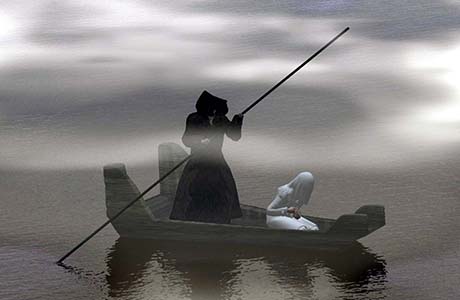I knew a couple of days ago that this was coming, but it still hit me hard Saturday afternoon when a good friend contacted me to say his mom had died just 20 minutes before.
Mary Harris was one of the sweetest women I’ve known. I got to know her about 15 years ago when she was learning to use an iMac and I became her informal tech support person. She always felt guilty for asking for help, so she would wait until her problem had gotten worse and worse. Then I’d finally get an email or a call asking for help
She was an incredibly gentle and gracious soul. I never heard her speak a negative word about anybody or anything. I’ve known for months that she was going downhill, but I was shocked by how quickly things changed. About 10 days ago, she took a short day trip and was walking stairs. By a week later, she couldn’t walk. And now she’s gone.
No matter what you believe about life after death, there’s an awful separation that comes with the death of the body. Even if we believe we will know a person’s spirit in another world, the separation for the present — and the unknown about the future — can be unbearable.
We stumble through our years on this earth, trying to live the best we know how and trying to make connections with others. We tend to act as though we will live forever. We tend to treat our relationships as though there will always be another tomorrow in which to fix them.
Many of us know what it’s like to have a parent or close friend die with unresolved issues. I had to accept years ago that I would never have closure about the deaths of either of my parents. For me, it was a conscious decision which I made knowing the pain of that lack of resolution was better than continuing the relationships I had with them in life.
For other people, that lack of resolution comes suddenly and without a decision on their part. If a parent or other close friend or relative dies without warning, you can find yourself emotionally stuck in whatever place you were with that person. You never have the option to grow more with the person or to redefine what you are to one another as you both mature.
Some religious people have believed in an afterlife through human history. Others have not. Even among religious people, there’s always been disagreement and confusion about the subject. (One of the key issues which separated the Sadducees and Pharisees among Jewish people of Jesus’s day was whether there was an afterlife or not.)
Christians have believed in life after death, but there has been wide disagreement about what that afterlife is like.
Just today, I was listening to a physicist argue that the logic and evidence he understood had led him to a non-religious belief that the end of the body was not the end of the consciousness of a human being. (It was Dr. Robert Lanza, who argues for a theory which he called biocentrism.)
I used to believe I knew all the answers about life and death. My church taught me as a child that we had the answers, but I now see our knowledge as weak. I now see our certainties about such things as being more like whistling past a graveyard. I believe consciousness survives after the body dies here, but I can’t say I know for sure exactly what happens next.
I now have more questions than answers — about both life and death. And that uncertainty can cause me to feel very lonely at times.
When we’re honest — and when we confront the truth as we know it — our lives are full of uncertainty. But the inevitable death that waits for all of these mortal bodies is the one certainty we know — and that certainty hangs over all of us until the day comes when we have to slip down that path all alone.

 Girl to mom after parents fight: ‘Mom, is this what love will be?’
Girl to mom after parents fight: ‘Mom, is this what love will be?’ Just a performance: actors and politicians have a lot in common
Just a performance: actors and politicians have a lot in common When governments keep secrets, you’re probably being lied to
When governments keep secrets, you’re probably being lied to